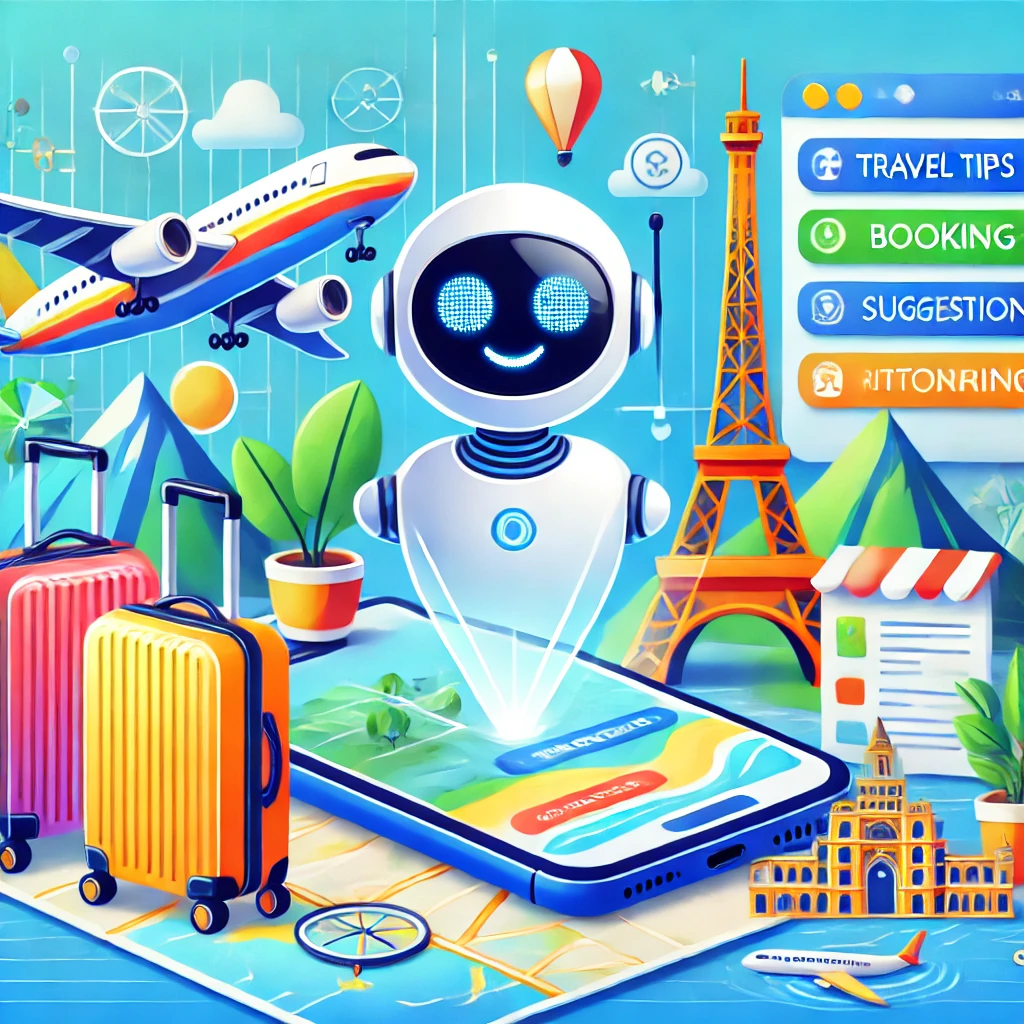Traveling has always been one of life’s greatest adventures. The thrill of discovering new places, immersing yourself in different cultures, and tasting unfamiliar foods makes travel a deeply enriching experience. However, as magical as the destination may be, the process of planning a trip can often feel overwhelming. Researching destinations, booking flights, finding accommodations, and navigating foreign countries can take a lot of time and effort.
Fortunately, a tool that’s reshaping how we plan our journeys—travel chatbots—offers a solution. Powered by artificial intelligence (AI), these digital assistants simplify trip planning. They provide recommendations, compare prices, and even help you book your entire trip, all with just a few taps. Let’s explore how chatbots are revolutionizing travel, with real-life examples showing how the industry is embracing this technology.
Personalized Travel Assistance at Your Fingertips
One of the greatest advantages of travel chatbots is their ability to offer personalized recommendations. Whether you’re an adventurous solo traveler looking for hidden gems or a family seeking budget-friendly accommodations, chatbots can tailor their suggestions to your preferences.
For instance, Lola, a travel app created by Kayak co-founder Paul English, uses AI to recommend trips based on your personal preferences. It asks questions about your budget, destination interests, and travel style. Based on your responses, Lola then tailors its hotel and flight suggestions, creating a seamless experience.
Similarly, Expedia’s chatbot helps travelers through Facebook Messenger. It offers accommodation options, booking assistance, and even flight status updates, all based on your previous searches and preferences.
These chatbots ensure you’re not getting generic advice. Instead, they provide personalized suggestions tailored to your unique travel needs.
24/7 Service and Immediate Responses
Another major benefit of chatbots is their 24/7 availability. Unlike traditional travel agents or customer service lines, chatbots are always available. You can get instant responses to your questions at any time of day.
For example, KLM Royal Dutch Airlines has a chatbot integrated with Messenger, WeChat, and WhatsApp. It helps passengers check in for flights, provides boarding passes, and gives real-time flight status updates. If you’re rushing to find your gate, this can significantly reduce your stress.
Additionally, KLM’s chatbot is multilingual. This means that travelers can get assistance in their native language, improving the overall experience. Similarly, Skyscanner offers a chatbot that works 24/7, helping travelers search for flights and compare fares in real time.
This round-the-clock service ensures that, no matter your time zone or situation, chatbots can quickly solve your travel problems.
Effortless Booking
Booking travel has never been easier. Gone are the days of juggling multiple tabs to book flights, hotels, and tours. Today’s chatbots integrate these services into one seamless process.
Booking.com uses chatbot technology to simplify the accommodation booking process. Through Facebook Messenger, travelers can book a hotel or hostel, compare prices in real-time, and make reservations—all in one chat.
Another example is DoNotPay, the world’s first robot lawyer. It helps users secure refunds and resolve customer service issues with airlines and hotels. If your flight is delayed or you face problems with accommodations, DoNotPay can file claims on your behalf, saving you both time and hassle.
These chatbots make booking and handling complex situations quick and stress-free. Travelers no longer need to visit multiple websites to manage bookings or solve problems.
Navigating Local Destinations
Chatbots aren’t just useful before your trip. Once you arrive at your destination, these bots continue to provide real-time information. They can help you navigate a foreign city, find local activities, or even overcome language barriers.
A popular tool for this is Google Assistant, which travelers use to ask for restaurant recommendations, directions, or transportation options. You can simply ask, “Where’s the best pizza near me?” or “How do I get to the airport?” Google Assistant gives you instant, accurate answers. It also provides real-time translations, helping you communicate better in foreign countries.
Another great example is Mona, a chatbot from Hipmunk. Mona not only helps you plan your trip but also offers local tips on events and attractions. It’s like having a personal tour guide in your pocket.
In Japan, tourists use LINE Travel—a chatbot built into the LINE messaging app. It assists travelers with hotel reservations and transportation options, making it especially helpful when navigating Japan’s complex public transport system.
These chatbots make it easy to explore new destinations without feeling overwhelmed. They provide local knowledge, save you time, and ensure you make the most of your trip.
AI and the Future of Travel
As AI continues to evolve, the capabilities of chatbots will only grow. These bots are expected to become even more intuitive, offering customized travel itineraries, sending real-time weather updates, or even suggesting in-trip activities like museum reservations.
Amadeus, a global travel technology company, is leading the way in AI and chatbot development. Their Ask Amadeus chatbot helps travel agencies answer questions, manage bookings, and offer suggestions. This shows how AI is not just improving customer experiences but also transforming the travel industry from the inside out.
In the future, we can expect chatbots to offer even more personalized services. From providing updates on travel disruptions to automatically checking you in for flights, they will continue to enhance every stage of your journey.
Conclusion
In today’s fast-paced world, convenience is key. Chatbots are becoming essential tools for modern travelers. Whether you’re booking a flight at 3 AM, seeking local tips in a foreign country, or comparing hotel prices, AI-powered travel chatbots offer seamless solutions that take the hassle out of planning.
Real-world examples like KLM’s chatbot and Booking.com’s chatbot show that the future of travel is here. As chatbots become smarter and more capable, they will continue to evolve into the perfect travel companions, helping you navigate the world with ease.
Next time you’re planning a trip, let a chatbot handle the details, and focus on the excitement of exploring new places!
Sign up for a free demo today
Streamline your customer support, sales and marketing through conversational AI and chatbots.
Get a Free Demo Today